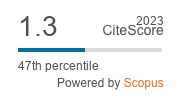European Regional Space Classification Regarding Smart Growth Level
DOI:
https://doi.org/10.2478/v10103-012-0038-2Abstract
Europe 2020 strategy, as the successor of Lisbon strategy, represents the vision of social market economy for Europe of the 21st century covering three related priorities: 1/ smart growth: knowledge based economy and innovation growth; 2/ sustainable growth: support for effective and taking advantage of resources economy which is more environmentally friendly and more competitive; 3/ inclusive growth: support for high employment level economy providing social and territorial cohesion. The paper presented classification results including European regional space positional statistics regarding advancement and smart growth level in NUTS 2 regions. Regional smart growth covers three pillars: innovation, creativity (Knowledge Based Economy) and smart specialization illustrated by characteristics available in Eurostat data resources. These qualities constituted the basis for constructing aggregate measures for specific pillars and also for the purposes of regional classification. The results of obtained classes were assessed in an overall European space, in groups of regions distinguished in line with integration processes chronology and also in capital regions and these including the country capital, as well as in the system of Polish regions.
Downloads
References
A strategy for smart, sustainable and inclusive growth (2010), COMMUNICATION FROM THE COMMISSION, EUROPE 2020, European Commission, COM(2010) 2020 final, Brussels
Google Scholar
Digital Agenda Scoreboard (2011), Commission Staff Working Paper, SEC(2011) 708, European Commission, Brussels
Google Scholar
EUROPA 2020. Strategia na rzecz inteligentnego i zrównoważonego rozwoju sprzyjającego włączeniu społecznemu (2010), Komisja Europejska, Komunikat Komisji, KOM(2010)
Google Scholar
Innovation Union Competitiveness report (2011), Directorate-General for Research and Innovation, Directorate-General for Research and Innovation, Research and Innovation, European
Google Scholar
Commission, Luxembourg: Publications Office of the European Union Knowledge Assessment Methodology (KAM) (2006), World Bank Institute, World Bank, Washington
Google Scholar
Kukuła K. (2000), Metoda unitaryzacji zerowanej, Biblioteka Ekonometryczna, Wydawnictwo Naukowe PWN, Warszawa
Google Scholar
Markowska M., Strahl D. (2003), Statystyki pozycyjne w klasyfikacji porównawczej, [w:] K. Jajuga, M. Walesiak (red.), Klasyfikacja i analiza danych – teoria i zastosowania. SKAD, Prace Naukowe Akademii Ekonomicznej nr 988, Taksonomia 10, AE, Wrocław
Google Scholar
Regions in the European Union. Nomenclature of territorial units for statistics NUTS 2006/EU-27 (2007), Series: Methodologies and Working Papers, European Commission, Luxemburg
Google Scholar
Strahl D. (2002), Klasyfikacja regionów z medianą, [w:] J. Dziechciarz (red.), Zastosowania metod ilościowych, Prace Naukowe Akademii Ekonomicznej nr 950, Ekonometria 10, AE, Wrocław
Google Scholar
Youth on the Move (2010), Publications Office of the European Union, European Union, Luxembourg
Google Scholar
Downloads
Published
How to Cite
Issue
Section
License

This work is licensed under a Creative Commons Attribution-NonCommercial-NoDerivatives 4.0 International License.











